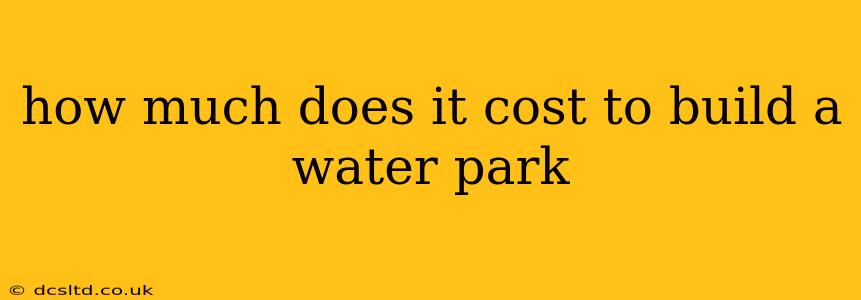How Much Does It Cost to Build a Water Park? A Deep Dive into Construction Costs
Building a water park is a significant undertaking, demanding substantial financial investment. The total cost isn't a simple figure, as it wildly fluctuates depending on several key factors. This article will delve into these cost drivers, providing a comprehensive overview to help you understand the financial landscape of water park development.
What Factors Determine Water Park Construction Costs?
The price tag for your water park dream can range from several million dollars for a smaller, simpler park to hundreds of millions for a large-scale, elaborate resort. Several critical factors influence the final cost:
-
Size and Scale: This is arguably the most significant factor. A small, community-based water park with a few slides and a lazy river will be far less expensive than a massive resort with wave pools, elaborate water attractions, and extensive amenities.
-
Location: Land costs vary drastically depending on geographical location. Prime waterfront property in a densely populated area will be significantly more expensive than land in a more rural setting. Construction costs also vary regionally due to labor rates and material prices.
-
Amenities and Features: The complexity and number of attractions directly impact the cost. Basic slides are cheaper than high-tech, interactive water rides. Adding features like wave pools, lazy rivers, splash pads, restaurants, cabanas, and other amenities significantly increases the overall budget.
-
Technology and Innovation: Incorporating cutting-edge water park technology, such as virtual reality elements or advanced water filtration systems, adds to the expense.
-
Construction Materials: The choice of materials—from concrete and steel to specialized water park-grade plastics—plays a role in the overall cost. High-quality, durable materials will often result in higher upfront costs but potentially lower maintenance expenses in the long run.
-
Permits and Licensing: Navigating the regulatory landscape and obtaining necessary permits and licenses adds to the overall expenditure. These costs vary by location and the complexity of the project.
-
Labor Costs: Construction requires skilled labor, and the cost of labor varies by region and the complexity of the project. Highly specialized labor for complex attractions will add to the expense.
What are the typical costs associated with building a water park?
While providing an exact figure is impossible without specific details, here's a general breakdown of cost categories:
-
Land Acquisition: This can range from a few hundred thousand dollars to tens of millions depending on size and location.
-
Design and Engineering: Professional design and engineering services are essential to ensure safety and functionality. Expect to allocate a significant portion of the budget to these crucial stages.
-
Construction: This comprises the majority of the overall cost, covering labor, materials, and equipment. This can easily run into tens of millions, even for smaller parks.
-
Equipment and Rides: The cost of slides, wave pools, and other attractions varies depending on size, complexity, and manufacturer. These can be substantial expenses, particularly for larger, more sophisticated rides.
-
Amenities and Infrastructure: This includes landscaping, restrooms, changing rooms, concessions, parking, and other support facilities.
-
Permits and Legal Fees: Expect to allocate a portion of your budget to cover permit applications, legal counsel, and other regulatory expenses.
How can I reduce the cost of building a water park?
-
Phased Development: Constructing the park in phases allows for managing costs more effectively and potentially attracting funding in stages.
-
Strategic Location: Choosing a location with lower land costs and readily available skilled labor can significantly reduce expenses.
-
Value Engineering: Careful design and material selection can help optimize costs without compromising quality or safety.
-
Modular Construction: Utilizing prefabricated components can streamline the construction process and reduce labor costs.
What are some common questions about water park construction costs?
H2: What is the average cost per square foot to build a water park?
There's no single "average" cost per square foot. The cost significantly varies based on the complexity of the park, the types of rides and amenities included, and the location. Simpler parks might cost less per square foot than more elaborate ones, even with similar square footage. To get a reliable estimate, you'll need a detailed design and cost analysis from experienced water park developers and construction professionals.
H2: Can I get a loan to build a water park?
Securing financing for a water park project often involves approaching specialized financial institutions familiar with large-scale recreational projects. A solid business plan and detailed financial projections are critical to convincing lenders of the project's viability. You'll likely need to demonstrate a strong understanding of the market, operational costs, and revenue projections.
H2: How long does it take to build a water park?
The construction timeline depends on the project's size and complexity. Smaller parks may take a year or two, whereas larger, more intricate projects could take several years to complete.
H2: What are the ongoing operational costs of a water park?
Ongoing operational costs include staffing, utilities, maintenance, repairs, marketing, and insurance. These expenses are significant and should be factored into the overall financial planning.
Building a water park is a complex and expensive endeavor. Thorough planning, detailed budgeting, and engaging experienced professionals are essential to successfully navigate this process. Remember to factor in all aspects—from land acquisition to ongoing operational costs—for a realistic financial assessment.
